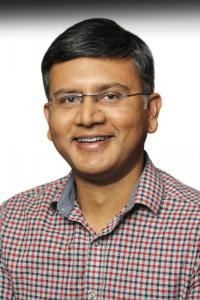Syed Abid Hussaini, PhD
- Assistant Professor of Pathology and Cell Biology (in the Taub Institute for Research on Alzheimer's Disease and the Aging Brain)

Overview
Dr. Hussaini received his doctoral degree (Ph.D) in Neurobiology at Freie Universität Berlin, Germany where he worked on neurobiology of learning and memory. He did his postdoctoral training in the Department of Neuroscience at Columbia University where he studied the neural correlates of spatial memory in the hippocampus in Dr. Eric Kandel's lab. He was a visiting scientist in the Moser group at the Norwegian University of Science and Technology in Trondheim, Norway, where he studied the role of entorhinal cortex in spatial memory.
He joined the Taub Institute and the Department of Pathology and Cell Biology to study the Neurobiology of Aging and Alzheimer's disease.
Academic Appointments
- Assistant Professor of Pathology and Cell Biology (in the Taub Institute for Research on Alzheimer's Disease and the Aging Brain)
Languages
- German
- Hindi
- Tamil
- Urdu
Credentials & Experience
Education & Training
- BS, 1999 Environmental Science, Bangalore University (India)
- MS, 2001 Toxicology and Pharmacology, University of Madras (India)
- PhD, 2008 Neurobiology, Freie University of Berlin
Committees, Societies, Councils
- Alzheimer's Association
- Society for Neuroscience
- New York Academy of Sciences
Research
The lab aims to understand the neural correlates of cognitive dysfunction by studying regions of the brain that are most vulnerable to aging and disease. The entorhinal cortex-hippocampal (EC-HPC) circuit is a major network hub for memory and its neurons are among the first to be affected in AD, leading to impaired memory. Dr. Hussaini's lab uses in vivo electrophysiology and optogenetic/chemogenetic techniques in freely behaving mice to study the neuronal (dys)function in the EC-HPC circuit. The lab uses novel mouse models of Alzheimer's disease (from Dr. Karen Duff) that closely mimic pathologies and cognitive impairments as seen in humans. The overarching goal of the lab is to detect neuronal dysfunction in earlier stages of the disease and to restore cognitive function by manipulating neurons with optogenetic/chemogenetic and electrical stimulation.
Research Interests
- Aging and Dementia
- Alzheimer's Disease
- Cognitive disorders
- Sleep-related memory loss
- Spatial memory
Selected Publications
- Fu H#, Rodriguez GA#, Herman M, Emrani S, Nahmani E, Barrett G, Figueroa HY, Goldberg E, Hussaini SA#*, Duff KE*, Tau Pathology Induces Excitatory Neuron Loss, Grid Cell Dysfunction, and Spatial Memory Deficits Reminiscent of Early Alzheimer's Disease. Neuron 93, 1-9, February 8, 2017. #Equal contribution *Co-senior.
- Wang S, Kugelman T, Buch A, Herman M, Han Y, Karakatsani ME, Hussaini SA, Duff KE, Konofagou E, Non-invasive, Focused Ultrasound-Facilitated Gene Delivery for Optogenetics. Sci Rep. Jan 6 2017;7:39955.
- Fu H, Hussaini SA, Wegmann S, Profaci C, Daniels JD, Herman M, Emrani S, Figueroa HY, Hyman BT, Davies P, Duff KE, 3D Visualization of the Temporal and Spatial Spread of Tau Pathology Reveals Extensive Sites of Tau Accumulation Associated with Neuronal Loss and Recognition Memory Deficit in Aged Tau Transgenic Mice. PLoS One Jul 28 2016;11(7).
- Wu JW, Hussaini SA, Bastille IM, Rodriguez GA, Mrejeru A, Rilett K, Sanders DW, Cook C, Fu H, Boonen RA, Herman M, Duff KE, Neuronal activity enhances tau propagation and tau pathology in vivo. Nat Neurosci. 2016 Aug;19(8):1085-92.
- Hussaini SA, Kempadoo KA, Thuault SJ, Siegelbaum SA, Kandel ER., Increased size and stability of CA1 and CA3 place fields in HCN1 knockout mice. Neuron 2011 Nov 17;72(4):643-53.
- Giocomo LM, Hussaini SA, Zheng F, Kandel ER, Moser MB, Moser EI., Grid cells use HCN1 channels for spatial scaling. Cell 2011 Nov 23;147(5):1159-70.
For a complete list of publications, please visit PubMed.gov